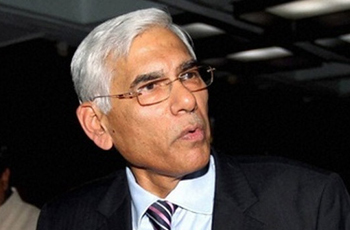New Delhi, Aug 24: In fresh embarrassment to the erstwhile UPA regime, particularly to former Prime Minister Manmohan Singh, former CAG Vinod Rai has claimed that coalition functionaries had deputed politicians to get him leave out names from the audit reports in the Coalgate and Commonwealth Games scams.
 In remarks damning the previous dispensation, he has also claimed that UPA functionaries had roped in even his colleagues in the IAS, to which he belonged before his appointment as CAG, to persuade him to leave out names.
In remarks damning the previous dispensation, he has also claimed that UPA functionaries had roped in even his colleagues in the IAS, to which he belonged before his appointment as CAG, to persuade him to leave out names.
Like some of the books that have recently hit the stands including those by the media adviser of the former prime minister Sanjay Baru, former External Affairs Minister K Natwar Singh and former Coal Secretary P C Parakh that have been severe on Singh and his government, Rai is penning his views in his forthcoming book "Not Just An Accountant" to be released in October, that will be critical of the UPA regime.
Rai, who had demitted office last year after several run-ins with the UPA government and had estimated a "notional"loss of Rs. 1.76 lakh crore in the 2G spectrum allocation and Rs.1.86 lakh crore in Coal Block allocations, was severe in his comments to Times of India on Singh.
He has said he would provide details of how sheer considerations of survival led Singh to acquiesce to decisions which caused huge loss to the exchequer.
"See the prime minister is the first among equals.He has to take the last call which sometimes he did, sometimes he didn't.Everything cannot be sacrificed only to remain in power. Governance cannot be sacrificed at the altar of compulsion of coalition politics. I have said it in the book," he said.
Today, Rai refused to meet reporters who reached his residence and declined to comment on the report. But sources close to him said, "Each and every word in the book is factually correct. The purpose is not to tarnish image of somebody but to help in improving governance and systems in future. The language used in the book is so simple that people from all walks of life including students can understand," they said.
Asked why Rai is making these comments now and not earlier, the sources said, he was holding a constitutional post at that time and it would have undermined the status of the institution which he headed.
"Now he is free to talk about it and in the book he has spoken about every person, taking their names, who had criticised the institution and the mandate of the CAG to do performance audit," the sources said.
They said the title of the book was inspired from a Supreme Court observation in a judgement in a PIL that "the CAG is not just a munim (account)."
Rai also said it was during the meetings of Parliament's Public Accounts Committee that he came under pressure from the Congress members of the Committee, who put tough and hostile questions to him.





Comments
Add new comment